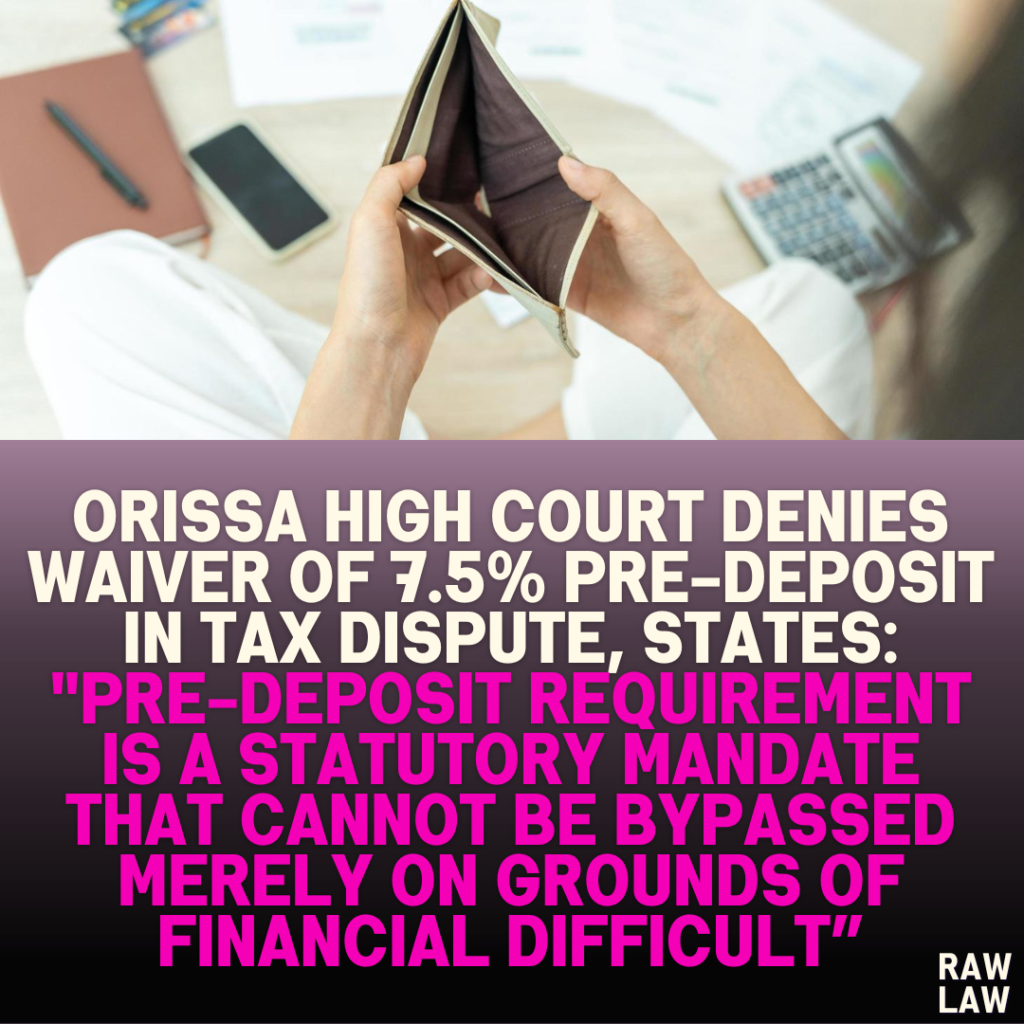Court’s Decision:
The Orissa High Court declined to interfere with the appellate authority’s requirement for a 7.5% pre-deposit of the adjudicated tax amount. The petitioner’s request for relief on the grounds of financial incapacity was rejected, with the court holding that the pre-deposit mandate cannot be waived merely based on financial distress.
Facts:
The petitioner, a private infrastructure company, was issued a show-cause notice alleging short payment of taxes on services rendered between April 2015 and June 2020. The petitioner claimed to have obtained discharge certificates under a voluntary disclosure scheme for the relevant period, asserting that no further liability could be imposed on the basis of the same facts. They sought judicial review to challenge the appellate authority’s directive to deposit 7.5% of the adjudicated tax amount as a precondition for hearing the appeal.
Issues:
The primary issue before the court was whether it could interfere with the requirement of making a pre-deposit as mandated by tax laws for proceeding with the appeal, especially when the petitioner claimed financial inability to comply with the requirement.
Petitioner’s Arguments:
- The petitioner contended that the pre-deposit requirement rendered the appeal remedy illusory, given its financial incapacity to make such a deposit.
- It was argued that the discharge certificates issued under the voluntary disclosure scheme precluded any further tax demands for the same period.
- The petitioner relied on the Supreme Court’s judgment in State of Tripura v. Manoranjan Chakraborty to suggest that the pre-deposit requirement could be relaxed in cases of financial hardship.
Respondent’s Arguments:
- The respondent, representing the tax department, argued that the petitioner’s financial condition did not warrant exemption from the statutory pre-deposit requirement.
- The department cited precedents, including Vijay Prakash D. Mehta v. Collector of Customs, which underscored that the statutory requirement of pre-deposit could not be waived through writ jurisdiction.
Analysis of the Law:
The court analyzed the statutory framework concerning pre-deposit requirements in tax adjudication. The legal provisions provide limited discretion to reduce the deposit amount, but there is no statutory provision for a complete waiver based on financial incapacity. The court reaffirmed that judicial interference in such matters should be exercised sparingly.
Precedent Analysis:
The petitioner cited Manoranjan Chakraborty to support the argument that the court could waive the pre-deposit requirement. However, the court distinguished the facts of this case from those in Manoranjan Chakraborty, noting that the Supreme Court in Manoranjan had upheld the statutory provisions on pre-deposits while recognizing that only in cases of gross injustice should writ jurisdiction be exercised to provide relief.
Court’s Reasoning:
The court emphasized that financial incapacity, without more, was not sufficient to justify judicial intervention to waive the pre-deposit mandate. Citing Whirlpool Corporation v. Registrar of Trade Marks, the court reiterated that while writ courts have the power to do substantive justice, such power should only be invoked in cases of palpable injustice. Since no such gross injustice was evident in this case, the court declined to exercise its jurisdiction to interfere with the appellate authority’s order.
Conclusion:
The court dismissed the writ petition, stating that the pre-deposit requirement is a statutory mandate that cannot be bypassed merely on grounds of financial difficulty. The petitioner was advised to seek appropriate remedies under the statutory framework.
Implications:
This judgment underscores the strict application of statutory pre-deposit requirements in tax disputes, reaffirming that courts will not easily waive such mandates unless gross injustice can be clearly demonstrated. The decision also clarifies that discharge certificates under voluntary disclosure schemes do not automatically bar further tax adjudication unless specific statutory provisions prevent it.
